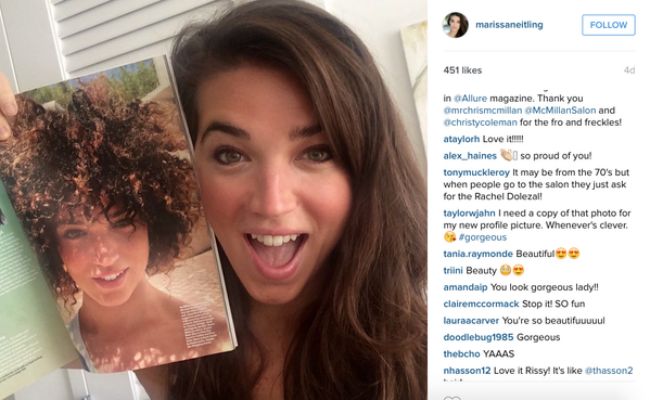If you opened Allure’s August 2015 issue you may have noticed an article titled “You (Yes, You”> Can Have An Afro…even if you have straight hair.” Even if you didn’t, the spread has since made its internet rounds, possibly at an accelerated pace in the wake of the Rachel Dolezal controversy. The step by step tutorial details how to get the style that is being “adopted by a new generation of tastemakers” on white actress and model, Marissa Neitling. The article makes no mention of the cultural symbolism or history of the Afro–rather, points to the hairstyle as a hip, trendy accessory to what’s in right now.
Chris McMillan, the hairstylist who styled the model’s hair, told Huffington Post that his take on the Afro (on a white woman”> was inspired by none other than Barbara Streisand in A Star Is Born. He came to his own defense, stating “I learned how to do hair from the African American girls in beauty school…I do black hair.” And yet, the significance of culturally appropriating this traditionally African American hairstyle was lost on McMillan, the editorial staff, and the model, who posted this photo on her Instagram after the issue became available to the public:
Shortly after the controversy erupted, she deleted the post.
Ana Kasparian, Karamo Brown, and Becca Frucht for The Young Turks summed up most of Black Twitter’s sentiments: “Afros made a statement of Black Pride [during the Civil Rights Movement]… Cultural appropriation actually is a really big problem. It’s a very complex issue…There is a double standard of beauty. White women get away with [this]…When you exclude the African American woman whose hair is naturally kinky, that’s when it becomes a problem. Include everyone in the conversation so we don’t feel like you are taking away what means so much to us.”
The tutorial and images were a part of a spread labeled “Retro Modern” with a teaser reading “These fearless hairstyles, born in the ’70s, are being adopted by a new generation of tastemakers.”
The line that separates cultural exchange and cultural appropriation is easily overlooked and often blurred. The tone deafness of this spread is blaring with insensitivity and miseducation. Understanding–and acknowledging–the significance of the historical origin and symbolism of the Afro could have garnered a more positive response.


